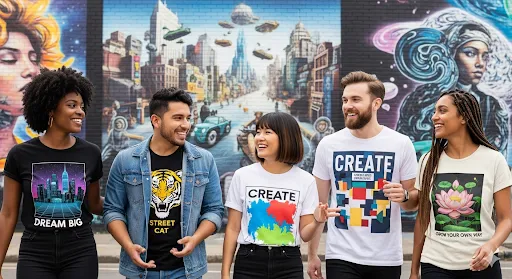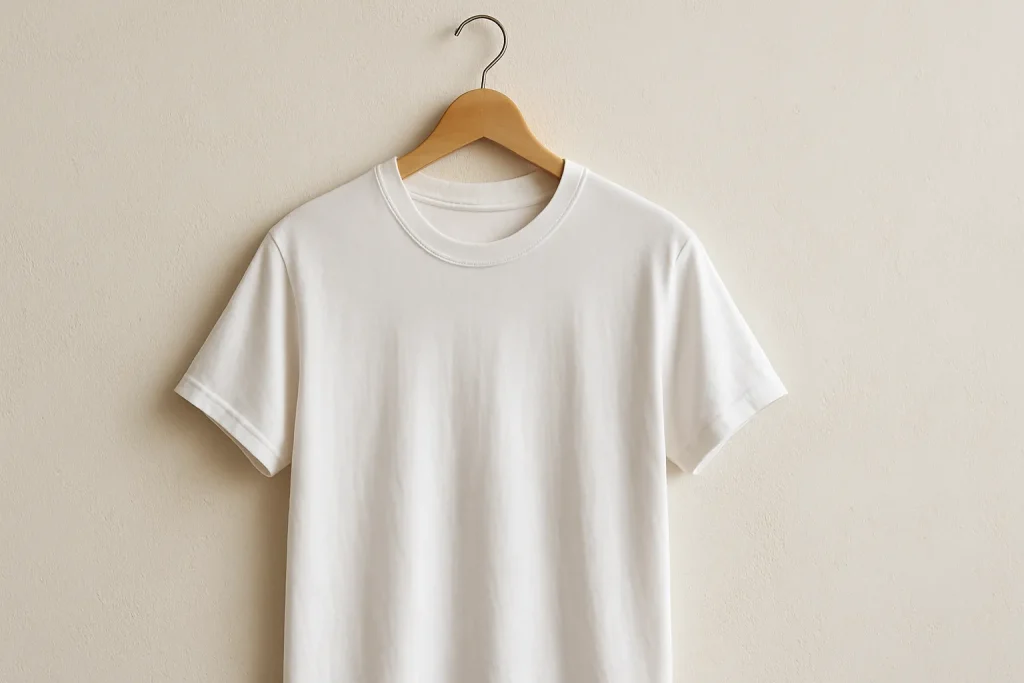Introduction
There are few garments as simple as the T-shirt: a piece of cotton fabric stitched into a T-shape with short sleeves and a round neck. Yet despite its simplicity, the T-shirt has become one of the most powerful tools of personal expression in modern society. More than just clothing, it is a canvas—one that carries art, identity, politics, humor, and belonging.
From band merchandise to protest slogans, from luxury fashion statements to do-it-yourself creations, the T-shirt has evolved into a cultural icon of self-expression. This article explores how a modest garment grew into a global symbol of individuality, communication, and creativity.
The Blank Canvas: Simplicity as Power
At its core, the T-shirt’s design is incredibly simple. This simplicity is its strength. Unlike heavily stylized garments, the plain T-shirt acts like a blank page. When printed on, painted, or embroidered, it transforms into a message board that can be read instantly by anyone passing by.
- Accessibility: T-shirts are inexpensive and widely available, which means anyone can own and customize one. This makes them more democratic than many other fashion items.
- Versatility: A T-shirt can be worn alone, layered, or styled in countless ways. Whether paired with jeans, skirts, or tailored suits, it adapts to personal aesthetics.
- Instant Communication: Because they are visible at eye level, T-shirts communicate messages directly to the public, functioning as wearable billboards.
This makes the T-shirt a uniquely powerful tool for self-expression compared to other clothing items.
Music and Subcultures: The Birth of Identity Tees
The connection between T-shirts and self-expression became especially strong in the mid-20th century through music and youth subcultures.
- Band Merchandise: In the 1960s and 70s, rock bands discovered that selling T-shirts with their logos, album covers, or tour dates created not just merchandise but a wearable badge of identity. Fans could signal allegiance to The Rolling Stones, Led Zeppelin, or later Nirvana by simply putting on a tee.
- Punk and DIY Culture: Punk subcultures in the 1970s revolutionized T-shirts by hand-customizing them with paint, safety pins, and slogans. Bands like the Sex Pistols encouraged rebellion, and the DIY T-shirt became a rejection of mass consumerism.
- Hip-Hop Fashion: In the 1980s and 90s, oversized graphic tees featuring graffiti-inspired designs, record label logos, or portraits of rap legends became symbols of authenticity and pride within hip-hop communities.
Through music, the T-shirt became an outward sign of belonging and identity, linking personal expression with cultural movements.
Political Power: T-Shirts as Protest and Propaganda
Perhaps no other garment is as politically charged as the T-shirt. Its accessibility and visibility make it the perfect vehicle for protest.
- Civil Rights and Activism: In the 1960s, activists wore T-shirts with messages supporting racial equality and anti-war protests. The simple garment gave ordinary people a voice in mass demonstrations.
- Feminism: Slogans like “The Future is Female” or “Girl Power” spread globally through T-shirts, making feminism wearable and visible in everyday spaces.
- Global Movements: From “Black Lives Matter” to climate activism, T-shirts have been central in spreading awareness. A slogan tee can turn an individual into a walking protest sign, amplifying causes in a way few other mediums can.
- Government Propaganda: On the flip side, governments and corporations have also used T-shirts to spread propaganda, showcasing the garment’s double-edged nature as a tool of persuasion.
T-shirts are more than fashion in this context—they are political statements, worn proudly as a symbol of belief and resistance.
Humor and Pop Culture: The Playful Side of Expression
Not all T-shirts carry heavy messages. Many serve as a vehicle for humor, irony, and fun.
- Catchphrases and Memes: A witty phrase on a T-shirt can spread like wildfire, especially in the internet age. Shirts featuring internet memes, jokes, or sarcastic comments allow wearers to express personality instantly.
- Pop Culture References: Movie franchises, TV shows, and video games often release T-shirts that let fans express their fandom. Wearing a Star Wars tee, for example, signals identity within a global community.
- Ironic Fashion: In recent decades, ironic T-shirts have become popular, with people wearing deliberately absurd or outdated slogans as a form of humor and commentary.
This lighter side of T-shirt culture highlights its role as a conversational piece, often sparking laughter or recognition among strangers.
The Rise of Streetwear: T-Shirts as Status Symbols
While T-shirts began as democratic garments, the rise of streetwear transformed them into luxury status items.
- Supreme and Limited Drops: Supreme, founded in the 1990s, mastered the art of scarcity. Limited-edition logo T-shirts became coveted items, with resale prices skyrocketing into hundreds or thousands of dollars.
- High Fashion Adoption: Designers such as Virgil Abloh, Demna Gvasalia, and Raf Simons elevated the T-shirt into luxury collections. A Balenciaga or Off-White tee can cost as much as a tailored dress.
- Collaboration Culture: Partnerships between streetwear brands, artists, and luxury houses have created collectible T-shirts that blur the line between art, commerce, and self-expression.
Wearing a particular T-shirt today doesn’t just express taste—it can signal wealth, cultural awareness, and access to exclusive communities.
Gender and Identity: Breaking Boundaries with T-Shirts
The T-shirt also plays a key role in challenging gender norms and exploring identity.
- Unisex Appeal: The T-shirt’s neutral design makes it inherently unisex. It resists rigid gender categorization, making it popular in the rise of genderless fashion.
- Queer Expression: For LGBTQ+ communities, T-shirts have long served as a medium for visibility—whether through pride slogans, rainbow graphics, or subcultural codes. Wearing such tees can serve both as personal pride and as an act of resistance.
- Body Positivity: Modern brands also use T-shirts to spread messages of body inclusivity, ensuring that expression extends beyond traditional fashion ideals.
Through these avenues, the T-shirt becomes more than clothing—it becomes a personal declaration of identity and belonging.
The Digital Age: Customization and Personal Branding
The internet and digital printing have ushered in a new era for T-shirt expression.
- On-Demand Printing: Websites like Teespring, Printful, and Redbubble allow anyone to design and sell T-shirts online, democratizing fashion creation.
- Social Media Influence: Influencers and content creators use T-shirts as branding tools, creating merchandise that represents their personal brand or online persona.
- NFTs and Digital Tie-ins: While controversial, some fashion brands experiment with merging physical T-shirts and digital ownership, showing how technology reshapes self-expression.
In today’s digital-first world, the T-shirt is both physical clothing and part of online identity-building.
Sustainability and Conscious Expression
In the 21st century, expression through T-shirts also reflects environmental and ethical concerns.
- Eco-Friendly Statements: Many brands now produce T-shirts with slogans promoting sustainability while using organic or recycled fabrics. The message is not only printed on the tee but embedded in its very material.
- Slow Fashion: Instead of mass-produced fast fashion, consumers increasingly seek unique or secondhand T-shirts to reduce waste while still expressing individuality.
- Activist Fashion Brands: Companies like Patagonia encourage not just wearing a message but living it, making T-shirts both symbolic and functional in sustainability movements.
Here, the T-shirt reflects values not only in what it says but also in how it is made.
Conclusion
From protest slogans to pop culture references, from streetwear status symbols to digital self-branding, the T-shirt has evolved into one of the most powerful tools of self-expression in the modern world. Its simplicity gives it flexibility, while its universality gives it reach.
The T-shirt communicates who we are, what we believe, and where we belong. It is political, personal, humorous, and fashionable all at once. In many ways, the T-shirt is more than a garment—it is language, art, and identity combined into fabric form.
As fashion continues to evolve, one thing remains certain: the T-shirt will continue to be the most democratic, iconic, and expressive item of clothing in human history.



